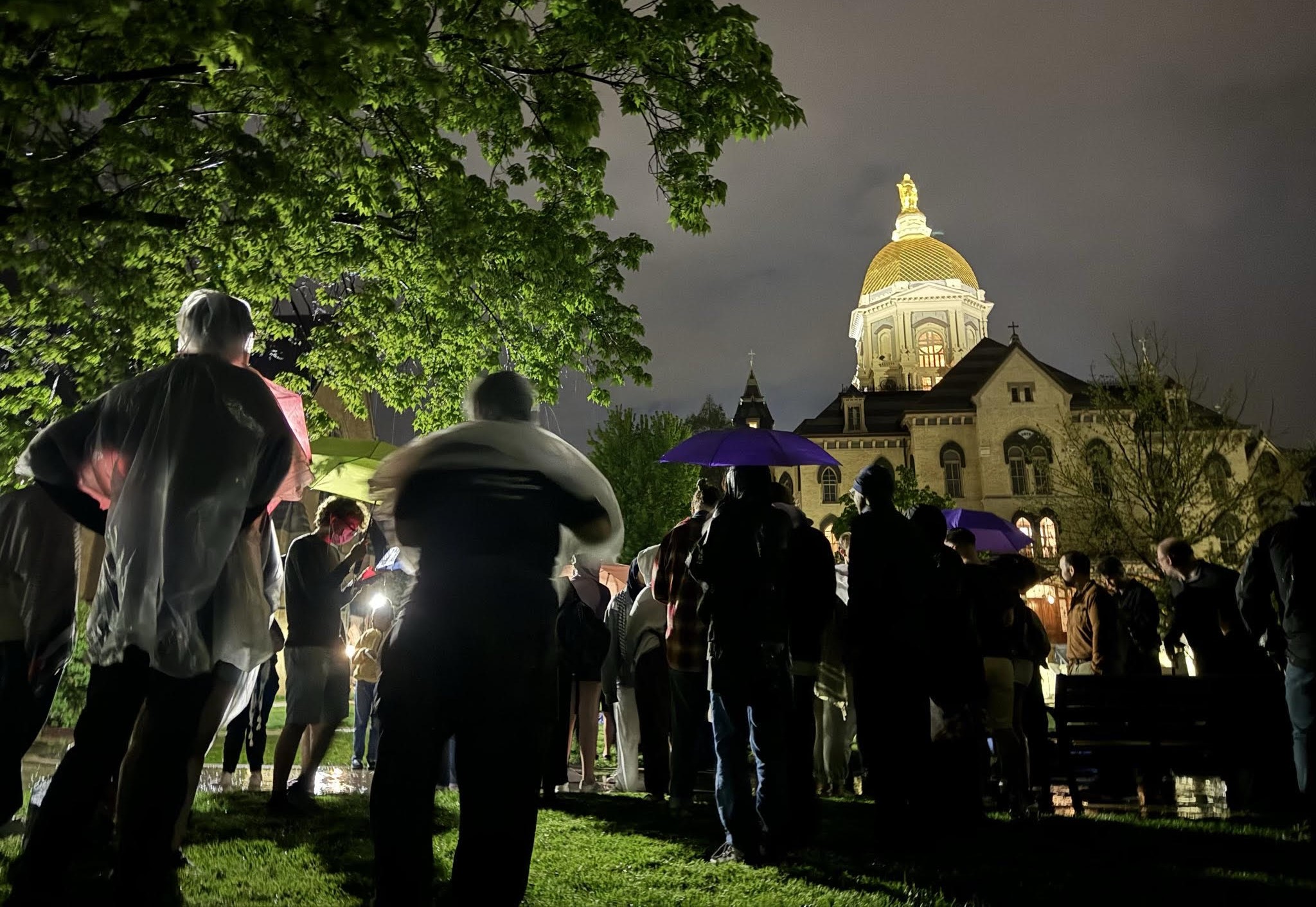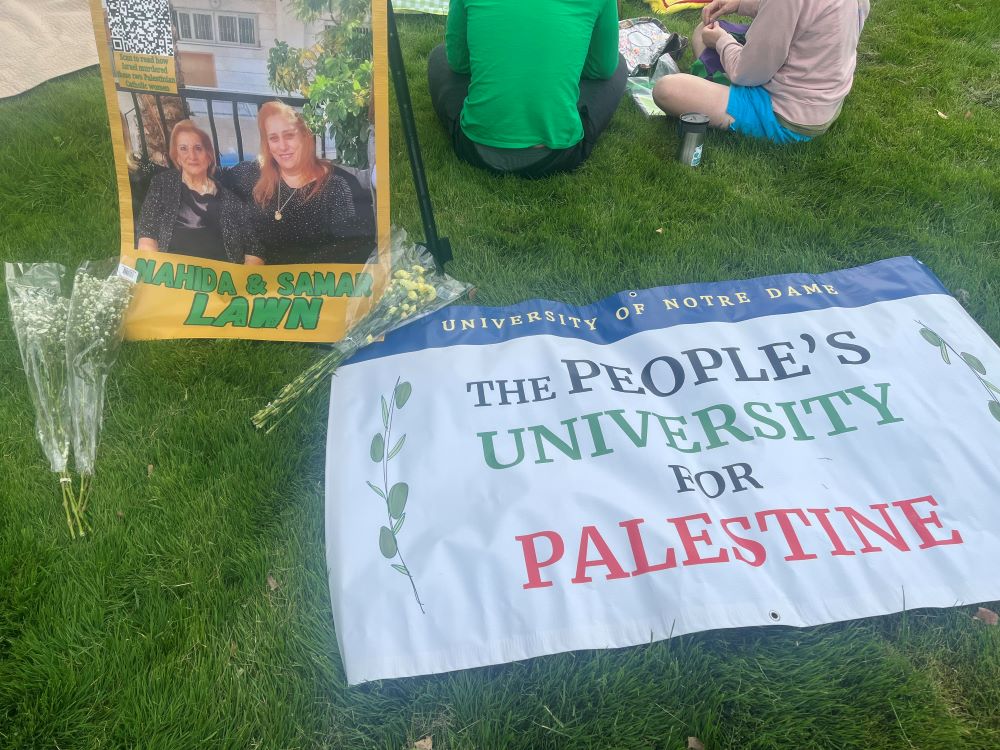
Soaked and cold from the rain, 16 protesters circled Notre Dame's basilica on May 2. The protesters, who called for the university to be transparent about its investments and to reexamine its relationships with Israeli universities, were later arrested after they refused police orders to disperse. (Ariel Thelander)
What does it mean to be a premier Catholic university? One that cultivates "a disciplined sensibility to the poverty, injustice, and oppression that burden the lives of so many" and aims "to create a sense of human solidarity and concern for the common good that will bear fruit as learning becomes service to justice"? One that contains one of the leading peace studies programs in the world?
And what does it mean when that university refuses to discuss whether its investments support the killing of nearly 38,000 people in Gaza?
To an unaware outsider, it may have appeared like a splendid picnic on the campus lawn. On May 2, several students hunched over laptops, class notes spread out on fuzzy blankets, everyone preparing for finals. To the side of the lawn, a custom-made banner depicted two women, with lettering below that read "Nahida & Samar Lawn," in honor of a Catholic Palestinian mother and daughter killed in Gaza.
As the students sat and chatted, a police delegation from the university arrived — five to six cop cars around the quad. The chief of police warned they would arrest anyone remaining on the lawn past 10 p.m. The student leaders said, "We will be peaceful, but we will not leave." By the time I arrived, nearly 50 people were on the lawn, many wearing keffiyehs — not a symbol of terrorism, but of Palestinian liberation. No chants. No offensive gestures. Just students sitting on the quad, peacefully gathering to ask Notre Dame to divest from any weapons manufacturers — investments that violate all seven Catholic social teaching principles. We were not seeking arrest.
We do not know where Notre Dame has invested, although we do know the university has increased its research partnership with Lockheed Martin — one of the largest weapons manufacturing companies — in recent years.
In the past, Notre Dame has realigned its investments according to Catholic social teaching principles and USCCB's investment guidelines. The school has also chosen not to allow its licensed products to be manufactured in countries that do not follow freedom of association guidelines. We believe that Notre Dame has the capacity, precedent and potential to divest from any weapons manufacturing companies today.
Following Catholic teaching and the Catholic peace tradition, we recall violence in the form of warfare is a direct denial of fundamental rights and a severe attack on humanity.
A local mosque donated so many chicken sandwiches that we had nearly 12 baskets left over. Attempting to shield our belongings from the rain, we assembled a pop-up canopy. Ten cops violently tore it up. We watched.
We received word that a dean would meet with us later. Some of the organizers met to decide how we should proceed. We sat together for a couple hours — Notre Dame students, faculty and staff — in hopeful expectation of a commitment to good faith dialogue about ensuring our investments align with Catholic social teaching values. Such investments reflect a blatant disregard for human rights by promoting the spread of weapons.
As more time passed and the meeting was further delayed, we began getting anxious. This was an encampment, after all, and we were just sitting on the periphery of campus — drenched, with no witnesses to the police and the threat of arrest. Yet we did not want to leave without demonstrating the seriousness of our commitments. So, we decided to move to God Quad — the grass in front of the Golden Dome. We did not chant, march with signs or assemble tents. A new delegation of police arrived, saying if we didn't leave by 9 p.m., we would be arrested.
The administrators finally came and met with a team of organizers. After 20 minutes, the administrators walked away, having completely dismissed us. All we requested was a meeting for continued good-faith dialogue about the university's investments and reevaluation of its ties to Israeli universities. They refused.
Soaked and cold from the pouring rain, 16 of us circled outside the basilica, under the gold-flashing Dome, where Our Lady watches. Our Lady who said in her Magnificat, "He has brought down the powerful from their thrones and lifted up the lowly; he has filled the hungry with good things and sent the rich away empty."
We refused to be intimidated on our own campus. Another student and I sat inside the circle armed only with cameras — I wiped the lens with my keffiyeh. Our Lady, encased in gold, looked down. A barrage of eight cops began to approach. "Mother Mary, pray for us now and at the hour of our death."
After six hours of silence, only now do we lock hands and start chanting, "Free, free Palestine!" Two white students are escorted peacefully by an officer. Trekking toward the van, one of them shouts, "It is the Catholic social teaching that results in us being arrested. It is following Gustavo Gutiérrez, Dorothy Day, Daniel Berrigan …" A student of color is picked up and thrown onto the ground by two officers, who quickly handcuff him. One officer plants his knee into the student's back with full weight. This pattern persists. A third officer nails his left knee into the student's legs. My hands shake, tears drip from my face as I record, up close, my friends being arrested. I braced myself to be treated the same. I glanced up at Our gold-plated Lady. She watches on.
Two more officers arrive and try to subdue another student. She is sitting, they lay out a tarp that looks like a body bag. A male officer clutches her left arm, and the female officer lifts her feet. Four officers carry her to the van atop the bag. Another student is thrown onto the ground on her belly by two officers as they forcibly handcuff her. Eventually, she is lifted and escorted. I overhear the cops complaining that they are running out of handcuffs. A few cops return, and we chant, "No justice, no peace!"
A student is on his knees as an officer snatches his left arm; another officer stretches his right arm, handcuffing him. A third officer constrains the student's legs. A tarp rips as they try to load him. They try to lift him, but as they near the police van, they resort to dragging his body over the ground. I think about Christ being dragged through the streets, carrying his cross. My eyes shift from the inhumane treatment of my new friends to Our Lady glistening above. She watches.
Then, they come for me. I brace myself to be thrown on the ground like so many of the others, to have knees in my back, to be shouted at. They take me without force. I feel guilty. We were all arrested and transported to the holding cells beneath the football stadium. The 17th arrestee, a student of color who was not part of the circle, was taken in for remaining on God Quad to film our brutal treatment.

During the May 2 protest at Notre Dame, a banner depicted two women, with lettering below that read "Nahida & Samar Lawn," in honor of a Catholic Palestinian mother and daughter killed in Gaza. (Sarah Seto)
Pope Francis has emphasized a "path to peace" since Oct. 7, when Hamas killed 1,200 Israelis and took more than 240 hostages. The U.S. Conference of Catholic Bishops states, "The Gospel calls us to be peacemakers. Our love for all our sisters and brothers demands that we promote peace in a world surrounded by violence and conflict." Our role as Catholic individuals and a Catholic institution is to embody Catholic social teaching by resisting war so that the heart of the Gospel may continue to pump life into the body of Christ, the church.
The USCCB's principle of "avoid doing harm" urges Catholic institutions to refuse to invest in companies that counter Catholic doctrine — and to divest from such companies. As critically minded self-reflective scholars, we knew that investing in weapons manufacturers is harmful and utterly antithetical to CST. Therefore, we are filled with the conviction that Notre Dame must not invest in these companies.
Of all the places God created, God became incarnate some 43 miles from Gaza. Our university is named after the holy woman who gave birth to the prince of peace, the God-turned-human who traversed Roman-occupied Palstine with the most ostracized members of society. He was brutally tortured and crucified for protesting the unjust treatment of others with his loving, peaceful actions.
Advertisement
Our university is named after the mother of the same divine-human who, according to the Gospel of Matthew, said, "Let the little children come to me, and do not stop them; for it is to such as these that the kingdom of heaven belongs." How can our university claim to believe these things if it does business with companies complicit in the killing of more than 14,500 children in Gaza?
Following Catholic teaching and the Catholic peace tradition, we recall violence in the form of warfare is a direct denial of fundamental rights and a severe attack on humanity. Furthermore, Catholic social teaching highlights the importance of solidarity and the interconnectedness of humanity. Backing industries that benefit from warfare may hinder endeavors to nurture global solidarity and collaboration, as it places profit above the common good and the welfare of individuals.
So, what does it mean to be a morally committed student at a leading Catholic university when that university, housing one of the leading peace studies programs in the world, is unwilling to discuss if its investments include weapons manufacturers? It means seeking solidarity when injustice makes studying for finals insurmountable. It means not seeking arrest and being arrested anyway. It means praying, praising, communing and, in our collective case, creating "a sense of human solidarity and concern for the common good that will bear fruit as learning becomes service to justice."




